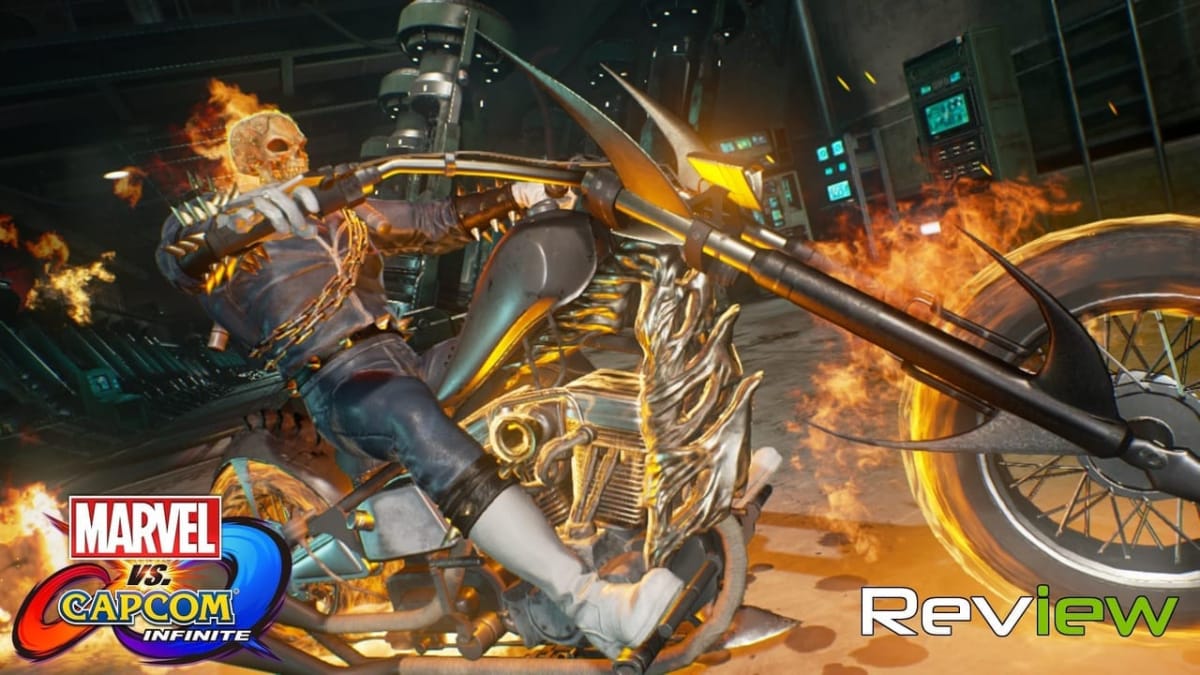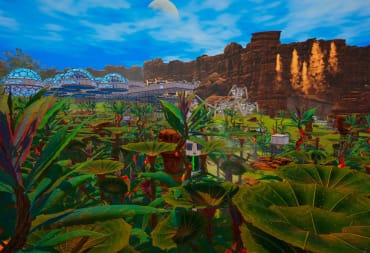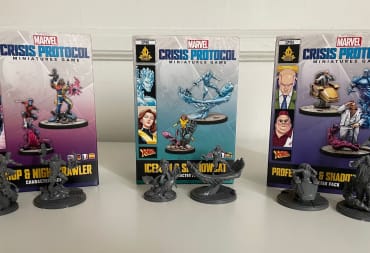Marvel vs. Capcom holds a special place in the industry. Nothing else outside of the Disney umbrella has ridden this distinct combination of mainstream appeal and hardcore mechanics to success. People buy these fighters to play as their favorite heroes, but only an elite few are able to unlock all of the nuances of its signature fast-paced combat. Marvel vs. Capcom: Infinite sees that balance shift slightly as it introduces simplified controls and a hypothetically crowd-pleasing single player story. Can the Versus series hold on to its legions of hardcore fans with nary a Mango Sentinel in sight? It's hard to say definitively, but Infinite is sure to be the most divisive entry in this long-running franchise.
One thing that Infinite sets out to do to is finally answer the question of how the universes of Marvel and Capcom collided. Or at least, provide a better answer than "random pirate lady rounded up some heroes to fight a void monster." Here, a pair of Infinity Stones have been gathered by the forces of evil, with Marvel's Ultron and Sigma from Mega Man X fusing into one amalgamation hellbent on ridding the world of organic life. The merger of worlds that occurs because of this causes several recognizable locales and organizations to be mixed and matched. For example, Resident Evil's everpresent Umbrella Corporation have melded with A.I.M. to become an evil B.O.W. producing factory headed up by MODOK.
To someone who grew up reading classic Marvel comics, this sounds like a dream scenario full of possibilities, but Marvel vs. Capcom: Infinite's campaign sees fit to squander that potential. The action takes place months after the universes merge, meaning that characters have mostly adjusted to their bizarre circumstances. Instead of seeing Hawkeye shake hands with Strider for the first time, we get an introduction featuring characters saying each other's names despite the fact that they're in an established team. It's just plain lazy writing and that style of storytelling continues throughout an adventure that basically consists of two big boss battles and a side trip to meet the stars of a future DLC pack.
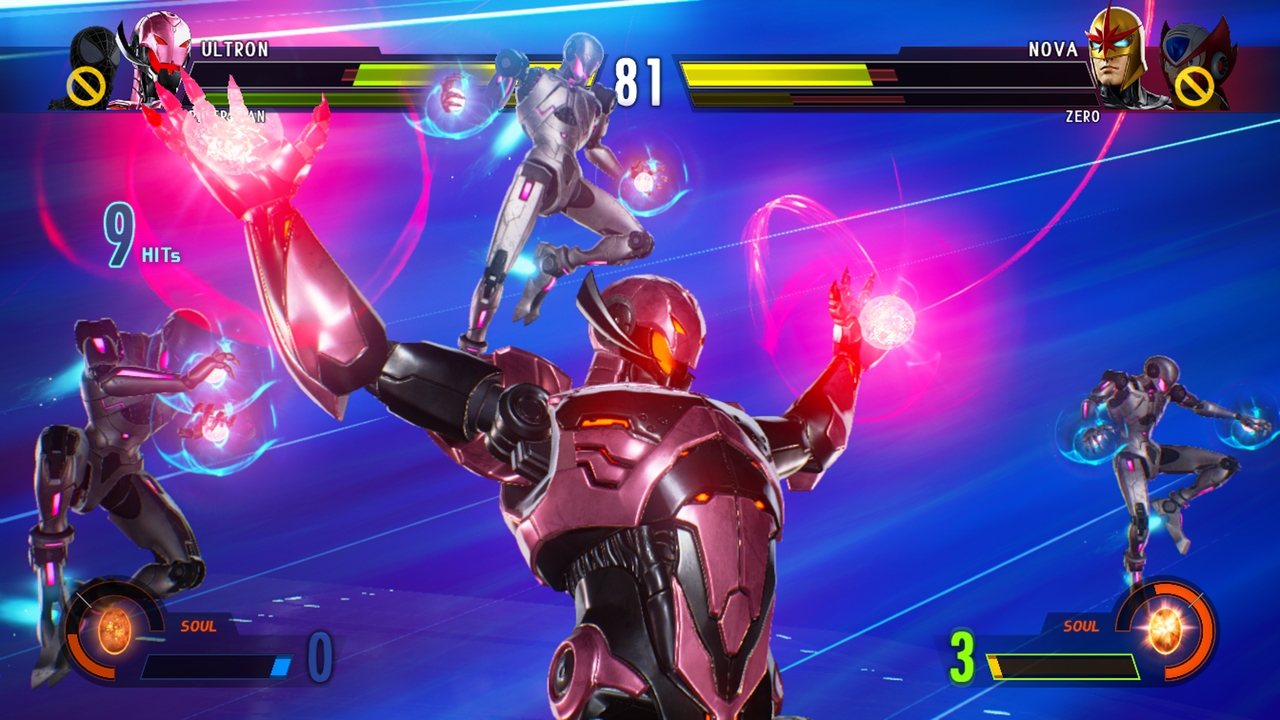
Some campaigns might counterbalance a less than engaging narrative with fights that draw you in, but Marvel vs. Capcom: Infinite is not among those ranks. Most battles are one-sided jobber matches against Ultron drones and mechanized Asgardians who overstay their welcome long before the credits roll. I do appreciate the few matches with special rules where you fight against a clock or deal with attacks from outside the bout, but everything just felt extremely easy at the default settings. Any stab at interesting mechanics falls flat, and the same goes for the campaign's "resolution." This half-hearted conclusion wraps things up about as sloppily as they started, and I struggle to think of anyone who will enjoy this story on its own merits.
The real shame about the state of the campaign is that the core gameplay of Marvel vs. Capcom hasn't really lost a step. I was skeptical at first, but this two on two incarnation lets players pull out crazy combos and infinite juggles just like the old days. The new Infinity Stones replace Marvel 3's X Factor with a set of six interesting perks that range from a short-range teleport all the way to reviving a fallen ally. No matter if you're duking it out online, hanging out on a couch with a friend, or going it alone in arcade mode, it all feels just right. The simplified hypers and mashable air combos give novices a leg up, but they'll quickly fall to anyone who knows what they're doing with their favorite fighter.
Of course, that's assuming that a player's main is in this game at all. For unspecified reasons that are most likely related to Marvel's continued campaign against Fox for superhero movie rights, the X-Men are nowhere to be seen in Infinite. Considering that this series can track its roots back to a game called X-Men: Children of the Atom back in 1994, this is a huge blow. Even discounting the mutant omission, Infinite's roster just doesn't pop. There are fewer fighters here than at any point in the last two decades, and almost every slot has been filled by a character returning from Marvel vs. Capcom 3 with nothing more than a few minor tweaks. I don't think that Spider-Man should drastically change styles from game to game, but the lack of substantive and interesting new challengers made me stare in indecision at the character selection screen more often than I'd have liked.
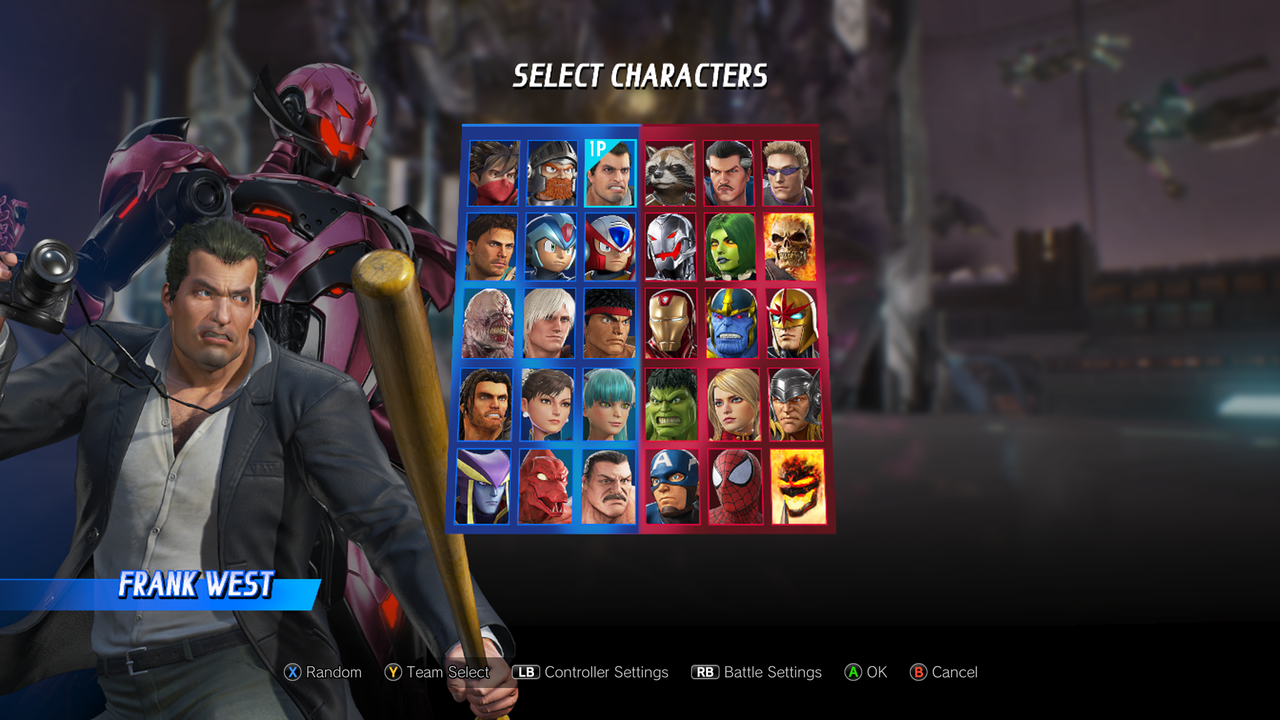
Still, there are plenty of winners here. Captain America and Iron Man are solid all-around picks and new additions like Gamora and Ultron attempt to fill the gap in quick strikers left by the absent Wolverine. Characters new and old have been balanced in terms of hyper combos, with each character getting two level 1 moves and one level 3. You can generally rely on those hypers being activated in the same way across characters, either through the two button easy hypers or the simplified true inputs. Either way, this makes jumping to different characters feel much better than in previous titles, as your skills can somewhat transfer from team to team.
Taking the game online produces good results. I've experienced few issues with lag, although the time between matches was sometimes longer than I would have liked on Xbox One. Whenever I did find a match, I was thoroughly crushed by the type of players who would buy a Marvel vs. Capcom game right at release. Even so, there's something to be said for a trial by fire, and I found myself jumping back in and applying a few tricks I learned through my failures. Selecting which stone fit with my team felt like a meaningful choice, and having the option to pull off a relatively powerful skill at the press of a button felt great. I still didn't get many wins, but the game's newfound accessibility really allowed me to stand a chance.
If you're not interested in playing online, there won't be much else for you to do once the story mode is conquered. You can fight your friends locally, take on the AI in an arcade ladder, practice in the training mode, or learn combos in the limited tutorial. This Mission Mode (which helpfully reminds you via tooltip that future gameplay patches will make it obsolete) allows you to test the majority of each fighter's moves, but it's not very helpful in a game so focused on attracting more casual players. There's nothing here that will teach you when and why to use each move, and you're better off learning the hard way than trying to get book smart.
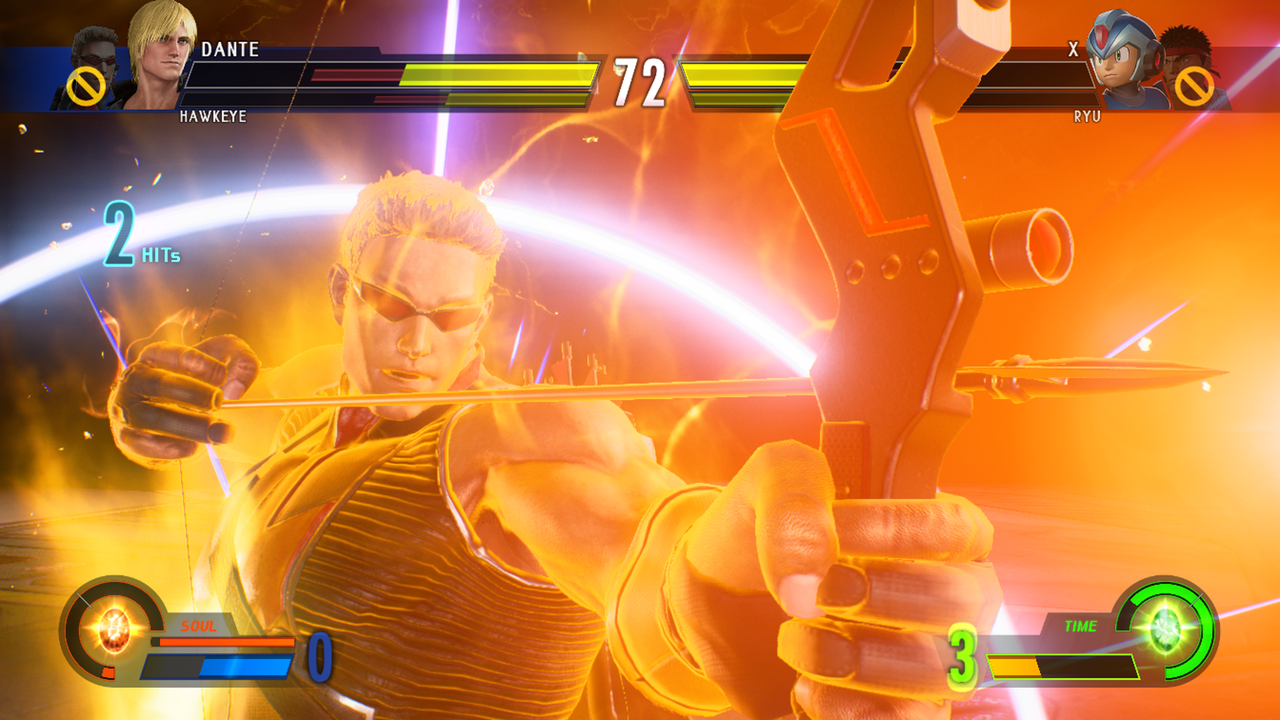
Presentation is another area where Infinite takes a hit. Much has already been written about the game's character models, and the day one patch could only really take things so far. Characters in motion look stiff, and some close-up animations lack the polish you'd expect from a major release. Still, the game's visual issues are nothing compared to the voice acting, which sometimes felt on par with a high school musical theater production. Any drama that the cutscenes could have had is drained away by stifled and uninterested line reads, and this even bleeds into some battle cries during fights. On the bright side, I did appreciate the many nods that characters give to their histories through pre-fight banter, and I always chuckled at Iron Man's protests when I teamed him up with Ultron.
The worst thing about Marvel vs. Capcom: Infinite is how little it feels like a full-fledged sequel. This is close to the bare minimum a company could produce as a follow-up to a beloved franchise, and the promise of a host of roster additions through DLC make the initial package feel even less substantial. Some of the new characters are fun to mess around with, and the Infinity Stones are a good iteration on what came before, but the sub-par presentation and limited roster instantly take the wind out of the game's sails. With all things considered, I can really only recommend Infinite to would-be tournament contenders or dedicated fans. Everyone else would be much better served by the current-gen re-release of Ultimate Marvel vs. Capcom 3.
Our Marvel vs Capcom Infinite review was conducted on Xbox One with a key provided by the publisher. The game is also available on PlayStation 4 and PC via Steam.
Review Summary
Capcom's latest fails to impress when compared to the past. The improvements in accessibility and reliable gameplay don't redeem its bargain bin presentation, lacking roster, and forgettable campaign.
(Review Policy)Pros
- Approachable Controls
- Frantic Gameplay
- Stable Online Support
Cons
- Limited Selection of Fighters
- Shoddy Character Models
- Underwhelming Story Mode
- Cringe Inducing Voice Acting
Have a tip, or want to point out something we missed? Leave a Comment or e-mail us at tips@techraptor.net
